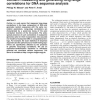100
click to vote
TCS
1998
15 years 1 months ago
1998
Results on random oracles typically involve showing that a class {X : P(X)} has Lebesgue measure one, i.e., that some property P(X) holds for “almost every X.” A potentially m...
NAR
2006
15 years 1 months ago
2006
CorGen is a web server that measures long-range correlations in the base composition of DNA and generates random sequences with the same correlation parameters. Long-range correla...
MFCS
2000
Springer
15 years 5 months ago
2000
Springer
Abstract. A binary sequence A = A(0)A(1) . . . is called infinitely often (i.o.) Turing-autoreducible if A is reducible to itself via an oracle Turing machine that never queries it...
108
click to vote
COCO
2003
Springer
15 years 6 months ago
2003
Springer
We review and slightly strengthen known results on the Kolmogorov complexity of prefixes of effectively random sequences. First, there are recursively random random sequences su...
118
click to vote
CCA
2009
Springer
15 years 8 months ago
2009
Springer
In the theory of algorithmic randomness, several notions of random sequence are defined via a game-theoretic approach, and the notions that received most attention are perhaps Mar...

